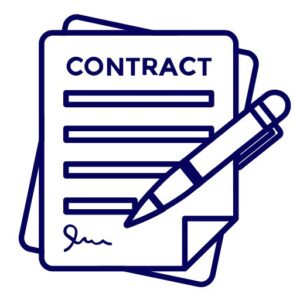Engaging Customers
If you knew what you know, would you do what you did? We enter into deals with our trading partners every day. It is the essence of business.
The Journey of Risk & Reward
Whether it is a good deal, or a bad deal depends on many factors. Some are within our control, and others are not. If I have learned anything in over thirty years of practicing law in the commercial law space, it is that I would rather be lucky than good.
Each deal involves risk management, not risk elimination. The only way to eliminate risk is to avoid opening the doors. Most of us do not have the luxury of choosing not to do anything. Instead, we work hard to generate income to support our families.
The Client Roadmap
This article is about managing risk and rewards by using great contracts with your customers. We will begin with the obvious question: Why do I need a contract with my customer in the first place? We will explore what areas need to be included. Then, we will end with how to find the right one for your business.
A Handshake or A Written Contract
Are you fine with a handshake? After all, business is about relationships. While it is true that many relationships can thrive overtime without a written contract, but many others learn a hard lesson without it. If “ifs” and “buts” were candy and nuts, oh what a world this would be!
Certain contracts MUST be in writing, like ones for land, guarantees, and deals where the performance lasts more than 1 year. The Uniform Commercial Code (“UCC”) requires all deals for the sale of goods over $500 to be in writing. Have you ever heard of an enforceable prenuptial agreement that was NOT in writing?
Written contracts define obligations and set remedies. If it is missing something, then a statute or the common law may fill in the gaps. This can be especially risky for a seller of goods.
The sale of goods is covered by Article 2 of the UCC. The UCC imposes certain implied warranties and consequential damages. If a seller fails to properly disclaim these implied warranties and damages in the contract, then the seller can be held liable if something goes wrong. Too many naive or otherwise inexperienced sellers have learned that liability for consequential damages can quickly lead them to the Bankruptcy Court. A seller can easily manage this risk with a simple contract.
Al Capone is quoted as saying “You get a lot more from a kind word and a gun than from a kind word alone.” When entering into a business deal, you get a lot more with a handshake and a signed contract, than with a handshake alone.
A written contract is much better at recalling details of the obligations of parties than relying on memories alone. Memories fade over time. My experience has taught me that memories fade much faster than ink!
A properly drafted contract enhance clarity. Clarity reduces the risk of a dispute. Antonin Scalia once wrote that “the main business of a lawyer is to take away the romance, the mystery, the irony, the ambiguity out of everything he touches.
What should a customer contract include?
The components of a sales contract will vary depending on the perspective of the author. Sellers strive to create an unconditional obligation to pay with little actual obligation to perform. But, “don’t hate the player, hate the game!”
Key Components of a Sales Contract
After defining the parties, the contract from the seller usually starts with the price, credit terms, and remedies for non-payment. It rarely includes many details about what will be delivered and when. Any discussion of warranty is usually focused on the disclaimer. Then in a font style that includes bold and ALL CAPITALIZED TEXT, you are likely to find limitation of liability, and rejection of any consequential damages.
The UCC requires that a seller provide inconspicuous disclaimers to avoid liability. Judges, over the years, have interpreted these statutes to require a seller to express disclaimers with the stylized fonts and magic words. I call them “magic words” because a non-lawyer would not appreciate the legal importance like words and phrases such as “merchantability” and “fitness for a particular purpose”. These words have special definitions that are usually only known to lawyers, or business parties that have been burned.
The last key element usually present in a sales contract involves dispute resolution. A seller is usually focused on getting paid. If the buyer is unwilling or unable to pay, the seller wants an advantage in the collection process. Choice of law and forum selection that favors the seller is normal. While the choice of law provision may be enforceable, the forum selection may present a problem for the seller.
Choice of law and forum selection clauses may benefit the seller by reducing the risk of adverse buyer protection laws and hostile forums. In addition, such provisions may steer any potential litigation to favorable statutes and a preferential forum. Arbitration language may limit the ability of a series of buyers to obtain class action status.
Since the seller is focused on collection activity, expect an attorney fee provision that requires the buyer to pay any of the seller’s legal fees and costs incurred pursuing the collection action. All of these tools lower the risk for sellers and increase the cost and risk to the buyer.
How to find a great sales contract
Where do you find great sales contract templates? The internet has tons available. However, using them may be a recipe for failure. You can even ask an AI tool to write one. However, there is a reason why lawyers go to school and practice for years.
The practice of law involves selecting the right template and customizing it for your particular need. If you plan on selling more than a few hundred dollars’ worth of low risk goods and services, then it is most likely worth the investment to consult a competent lawyer to help.
After guiding clients to thousands of successful deals, totaling billions of dollars in transaction volume over a thirty (30) year time horizon, the lawyers at Waldrop & Colvin can help you too. At Waldrop & Colvin, we have the knowledge and experience to do it right. If you think it is worth it to protect your assets with solid contracts that are easy to read and are tailored to your particular situation, then call Waldrop & Colvin at (757) 354-2167 or email partners@thelawdept.com. We strive to be the law department for your business.
Meet the Author
John Allen Waldrop
John Allen has a vast and impressive history of success in world class legal departments across several industries including government contracting, real estate development, medical technology, construction logistics & finance and private equity. He has been both a “one man band” as well as the leader of a team of high performing legal professionals. His experience delivers results in building brands, corporate governance, contracts and transactions, M&A, dispute resolution, employee management, and commercial real estate.
John Allen Waldrop offers a free 15-minute consultation.


